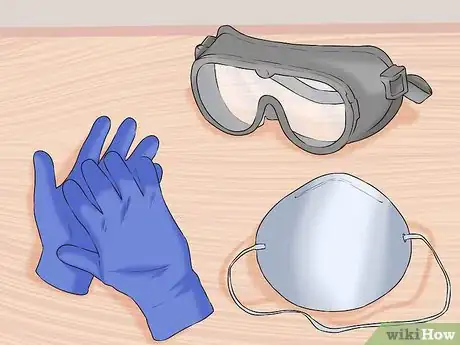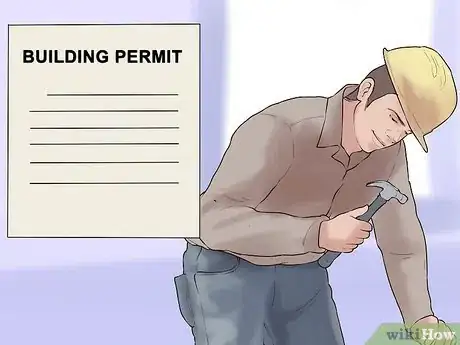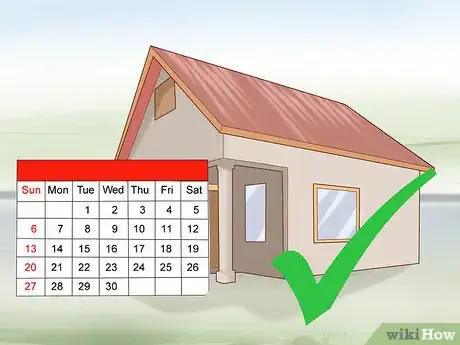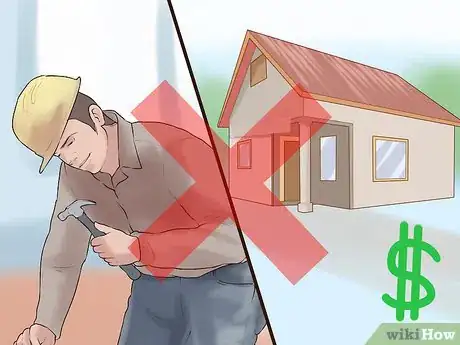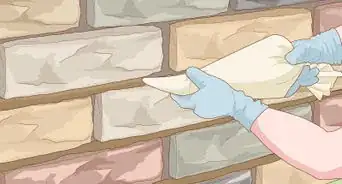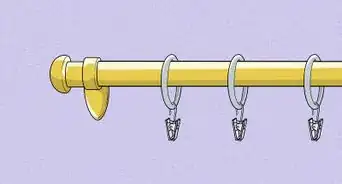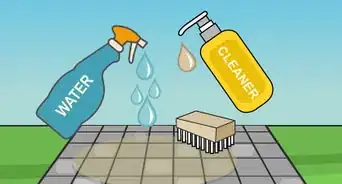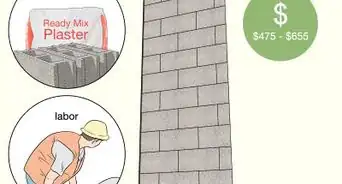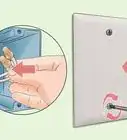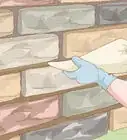X
This article was co-authored by Ken Koster, MS, a trusted member of wikiHow's volunteer community. Ken Koster is a homeowner in the San Francisco Bay Area who remodeled his own home in 2015. From permits to plumbing, demolition to final approval, he oversaw and took part in the entire process.
There are 10 references cited in this article, which can be found at the bottom of the page.
This article has been viewed 16,184 times.
Learn more...
Doing remodeling your projects yourself can be fun and even save you some money. However, they can easily get out of hand if the project is too big, or you don't know what you're doing. The key is to know your limitations, so you can figure out when to call in a professional.
Steps
Method 1
Method 1 of 3:
Comparing the Project to Your Skills
-
1Consider the scope. If the project is small, such as re-tiling a closet, that's probably something you can handle on your own. However, massive remodeling projects, such as completely renovating a kitchen, may be more difficult for you to handle. It can drag on for months and months if you don't know what you're doing. It's also important to consider your skill level. If you have never done any construction before, you probably don't want to start with a bathroom remodel project.[1]
- Look at every aspect of the renovation you want to complete and determine if it’s an amount of work you can complete by yourself.
-
2Assess your skill level. It's important to think about your skill level before starting any project, and it's equally important to be honest about it. If you've never picked up a hammer, start with a small project, like painting a room. Even if you have some experience, such as you've assisted other people with remodeling projects in the past, you need to consider just how much you can handle. If you've never worked with plumbing, start with a smaller project than remodeling the kitchen.
- Even if you feel comfortable doing the work yourself, have a handyman or contractor as a backup in case you run into something you’re unfamiliar with.
Advertisement -
3Learn the skills. If you're not sure whether you have the skills, try working with someone you know who does have the skills. You can assist them on a project, which will let you know if you're up to the task of completing a similar task at home. Plus, you'll learn some new skills that you can apply to your home project.
-
4Think about your safety. If you don't know how to use the power tools for the job, you may want to skip it unless you have the confidence to use tutorials to figure out how to use them. For instance, if you're not sure about how to use a power saw, you may want to skip projects that would require that tool until you learn more about it, as it can be very dangerous. Similarly, trying an electrical project without really knowing what you're doing can be very dangerous.[2]
- It's also important to think about the safety of other people in your home. In other words, you need to know how to create a construction area that will be safe for everyone involved.[3]
-
5Decide if it's a job meant for professionals. Certain jobs are generally best left to professionals who have the training and experience, due to the fact that they need to be professionally designed. For example, doing jobs like electrical wiring and plumbing haphazardly will often mean it's not up to the code required by your city. In that case, it will need to be redone by a professional anyway, and by then, you've spent twice the money you would have in the first place.[4]
- Jobs like electrical wiring, roofing, masonry, and plumbing should always be done by a professional unless you put in the hours to really learn what you're doing.[5]
- If any walls need to be removed, have professionals come to determine if the wall is load-bearing or if there are any electrical or plumbing requirements.
Advertisement
Method 2
Method 2 of 3:
Thinking About Outside Limitations
-
1Check if the job requires a permit. You can, of course, get a permit yourself to do the remodel job in your house. However, a contractor better understands what permits will be needed, and they will have an easier time navigating the system. If you don't want to deal with getting permits, leave the job to a professional.[6]
- Many home remodeling projects require permits, even something as simple as building a deck.
- Check with your city's permit office to see if the project you're considering requires one.
-
2Look at the building codes. Many projects will require you to follow certain building codes. If you look at the building code for your project and you don't understand a word of it, the project may be out of your range at the moment.[7]
-
3Think about how much time you have. When considering a remodeling project, consider how much time you have to actually devote to the project. You may only have a few hours each week, or you may be willing to devote whole weekends to it. Either way, compare the time you have with the likely amount of time it will take to complete the project, as that can help you decide if you want to commit to the project.[8]
-
4Take a hard look at your budget. Even if you don't hire a professional, a remodel project can end up costing a lot more than you thought in the beginning. Make sure you have enough in your budget before you start to take care of unexpected expenses.[9]
- Try taking your original estimation and doubling it. Do you still have enough to do the project?
- For instance, if you estimate that you need $250 to re-tile the bathroom, you may or may not stay under that projection. When you pull up the tile, you may find that you also need to replace the sub-floor or frame underneath, which can significantly increase your costs. You may also find plumbing problems that need to be fixed, putting you well over your original estimate of $250.
-
5Have a backup plan in place. If you find you're in over your head, you need to have a plan in place of what to do. Maybe you can call in a more skilled friend for assistance, or maybe you'll need to hire a professional. Either way, you don't want to be stuck in the middle of a project that you can't complete.
Advertisement
Method 3
Method 3 of 3:
Weighing the Cost of the Repair
-
1Ask yourself whether it's worth the time. You may be able to do a project yourself, but that doesn't mean you should. Consider the time and costs you'll entail doing yourself. If it's going to take you several weekends in a row or longer, is it worth it to you to do it yourself?[10]
- Remember, time is money. If you're putting time into this project, that's time you don't have for other things, including your family and your job.
-
2Consider whether the mess is worth it. Another factor to consider is the mess and complication it will add to your life. For instance, if you're working on the kitchen or a bathroom, the construction may make them unusable, meaning you'll have to find alternatives while you're working on the project.[11]
- Check with your city on where you can dispose of construction debris. You may be able to keep it on the curb, but you may have to get a dumpster.
-
3Think about whether you'll actually save money. That is, you can save money by doing simple projects yourself, such as painting a room. However, professionals can often get better deals on materials, plus they'll have all the tools to do the project. You may find that it evens out when it comes to cost.[12]
- Try comparing costs of doing it yourself to hiring a professional. Call around for professional estimates, and then compare that to what you estimate doing it yourself to cost. Don't forget to figure in more than you'll think you'll need, plus add in the cost of your time to the budget.
- Keep in the mind that some projects may be cheaper to do yourself, while others will be cheaper to let a professional do them.
-
4Don't do it just for the resale value. While remodeling part of your home can increase the resale value of your home, often you won't recoup as much money as you put into the remodel. For instance, on projects like remodeling the kitchen or bathroom, you'll likely only get back about half of what you put into it.[13]
- To increase the resale value, go for inexpensive projects like painting, landscaping, or flooring.
Advertisement
Expert Q&A
-
QuestionWhat do I need to know before remodeling?
 Ken Koster, MSKen Koster is a homeowner in the San Francisco Bay Area who remodeled his own home in 2015. From permits to plumbing, demolition to final approval, he oversaw and took part in the entire process.
Ken Koster, MSKen Koster is a homeowner in the San Francisco Bay Area who remodeled his own home in 2015. From permits to plumbing, demolition to final approval, he oversaw and took part in the entire process.
Homeowner Remember that everything might not go according to plan. You have your plan for how you're going to do the remodel, how much time it will take, and how much it will cost, but there are always surprises that come up. You have to manage those issues by prioritizing what's most important based on your budget and how much time you have.
Remember that everything might not go according to plan. You have your plan for how you're going to do the remodel, how much time it will take, and how much it will cost, but there are always surprises that come up. You have to manage those issues by prioritizing what's most important based on your budget and how much time you have.
Advertisement
References
- ↑ https://www.houselogic.com/remodel/budgeting-contracting/do-you-need-architect-your-remodeling-project/
- ↑ http://lifehacker.com/which-home-improvements-can-i-diy-and-which-should-i-le-487207936
- ↑ https://www.washingtonfederal.com/docs/default-source/default-document-library/wafed-remodelingebook.pdf#
- ↑ http://lifehacker.com/which-home-improvements-can-i-diy-and-which-should-i-le-487207936
- ↑ https://www.washingtonfederal.com/docs/default-source/default-document-library/wafed-remodelingebook.pdf#
- ↑ https://www.consumer.ftc.gov/articles/0242-hiring-contractor
- ↑ https://www.washingtonfederal.com/docs/default-source/default-document-library/wafed-remodelingebook.pdf#
- ↑ https://www.washingtonfederal.com/docs/default-source/default-document-library/wafed-remodelingebook.pdf#
- ↑ http://www.houzz.com/ideabooks/3839541/list/contractor-tips-top-10-home-remodeling-donts
- ↑ https://money.com/deck-remodel-diy-or-hire-a-pro/
- ↑ http://lifehacker.com/which-home-improvements-can-i-diy-and-which-should-i-le-487207936
- ↑ https://www.houselogic.com/save-money-add-value/money-saving-diy/diy-how-much-do-you-save/
- ↑ http://www.bankrate.com/finance/real-estate/6-worst-home-fixes-for-the-money-1.aspx
About This Article
Advertisement



